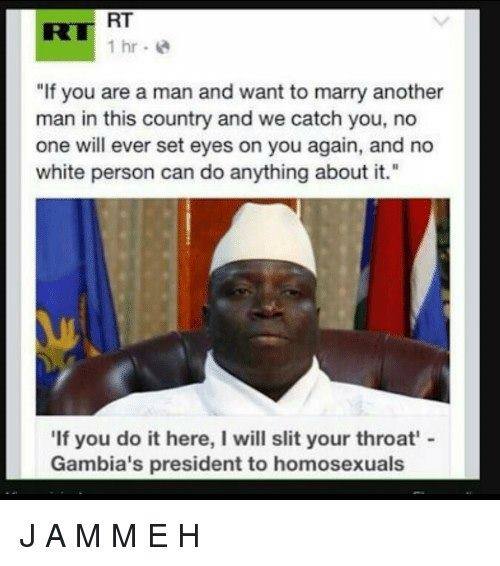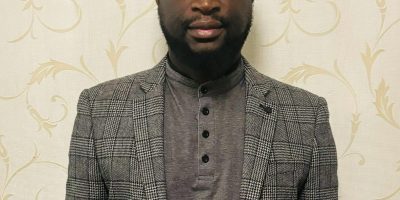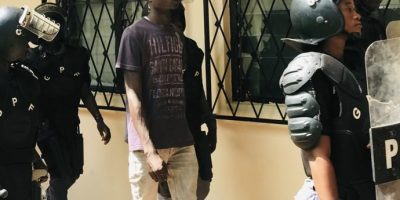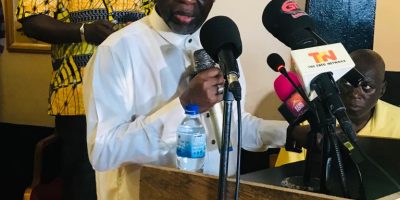 Previous publication November 2018.
Previous publication November 2018.
by Alagi Yorro Jallow.
Contradictions and Hypocrisy of (“Gordjiguène” or “Keewudaay”) -Repeal or Else……?
The homophobic strand that is currently woven throughout Africa reveals a certain level of contradiction and hypocrisy on the part of our political leaders who state that they are trying to uphold African values and cultures by criminalizing alternative sexualities. However, at the same time, LGBT rights in the Gambia and Western development aid has further replete it with layers of contradictions and potential hypocrisy. It is worth noting firstly that neither the Western leaders nor the African leaders are cogently consistent on their stated viewpoints regarding Homosexuality. Since Western development aid is essential for the African continent, it should not be used as a tool to dictate policy and legislative processes in Africa.
Whether the government of President Adama Barrow’s administration will repeal the aggravated homosexuality law or not remains unknown. However, there are pledges to repeal many of the draconian laws passed by Jammeh during his 22-year rule.
Gambian law, policies, and practices violate the internationally protected rights of LGBT people. Last year, Political leaders in The Gambia had expressed interest in repealing the horrific anti-LGBT legislation that was signed into law by former President Yahya Jammeh in 2014. The current law allows life sentences for “repeat offenders” or individuals found guilty of “aggravated homosexuality.”
Gambia’s Foreign Secretary Ousainou Darboe explained to local journalists that “Homosexuality was perhaps something Yahya Jammeh imagined bamboozling the clerics that were surrounding him…He used gay as a propaganda tool for him to continue to repress people.”
He said that “aggravated homosexuality was a distraction and should be taken out of the laws.”
Lawyer Darboe is the party leader of the United Democratic Party (UDP), a political group, and an active opposition party under the rule of Jammeh. Darboe confirmed that the UDP would also support the repealing of the law.
President Adama Barrow said Homosexuality is not an issue in the Gambia, an act that can send one in the country to prison for life.
Among those who could be charged with “aggravated homosexuality” are “serial offenders” and people living with HIV who are deemed to be LGBT or lesbian.
President Adama Barrow said, “homosexuality has never been an issue in this country” and that there are economic and other social issues that are more of a priority.
Homosexuality is not a popular political issue, and Barrow’s Minister of Tourism Hamat Bah said last year that “homosexuality will never be allowed in The Gambia.”
Gambia’s former President Yahya Jammeh said Homosexuality is anti-god, anti-human, and anti-civilization. He called homosexuals vermins and threatened to slit their throat.
Recently, Amnesty International, United Kingdom-based human rights organization in its annual report, which was released last week, raised concerns about gay rights in The Gambia. “Same-sex relations remained criminalized. A law approved in October 2014, for example, imposed sentences of up to life imprisonment for “aggravated homosexuality” offenses. LGBT people continued to suffer discrimination and threats from non-state actors, “the report noted.
The reaction of Western governments and donor organizations gives the strong impression that the respect of human rights, especially gay rights, is a prerequisite for any possible development aid to Africa. Nor is this kind of reaction solely restricted to the Gambian situation. The legislation of anti-homosexual laws in the Gambia has already sparked the reaction of Western governments, donors, and human rights organizations.
Western donors have used aid to directly persuade African countries to respect human rights, particularly about the decriminalization of Homosexuality. The United States government alluded to this connection by stating that American aid is closely linked to “the protection of fundamental freedoms and universal human rights.” They use their financial prowess to set conditions for any aid that they are giving to Africa.
President Adama Barrow’s claims to promote diversity in the Gambia ring hollow when he still delays for a repeal of the law against the gay community and actions against gay people are a glaring contradiction to his self-proclaimed profile as a ‘global moderate’ leader.”
The government should also act to “repeal laws criminalizing homosexual relations between consenting adults and replace the provision on non-consensual relations with a gender-neutral rape law” said by one human rights Activist. Repealing gay rights would free the Gambia’s legal system from a colonial past and historical prejudices.
The government’s view on the gay community’s rights is indicative of a broader disregard for the universality and indivisibility of international human rights. As a member of the United Nations, the Gambia is obligated to uphold the principles set out in the Universal Declaration of Human Rights, including that, “Everyone is entitled to all the rights and freedoms outlined in this Declaration, without distinction of any kind, such as race, color, sex, language, religion, political or other opinions, national or social origin, property, birth or another status.” A November 2014 report by the UN Office of the High Commissioner for Human Rights, which specifically addressed violence and discrimination based on sexual orientation and gender identity, made recommendations that have specific relevance to the Gambia.
President Barrow should commit to repealing all laws and policies that discriminate against gay people. He should end projects aimed at the conversion, marginalization, or stigmatization of gay people, and initiate a public awareness campaign aimed at ending hostility toward gay people. By doing so, the Gambia would take a giant step toward becoming a rights-respecting “modern democracy,” a goal President Barrow has repeatedly endorsed.
The United States condemned the passage of the anti-gay legislation in 2014 and called on the U.S. government to conduct a full diplomatic review of the U.S. relationship with The Gambia. Later that year, the U.S. government revoked Gambia’s eligibility for the African Growth and Opportunity Act, which gives preferential trade treatment to products from certain African nations.
The European Union withheld more than €33 million in aid to the Gambia over the deteriorating human rights conditions and concerns over the targeting of the gay community under the previous government.
“These draconian laws have no place in the 21st century, and the United States must send a clear message that the Gambian government cannot trample on its LGBT citizens,” said HRC President Chad Griffin. “We call on the U.S to conduct a full diplomatic review of the United States’ relationship with The Gambia.”
Before his defeat, President Jammeh had been one of the most aggressive opponents to gay rights equality, going so far as to say that he would “slit the throats” of men who wanted to marry other men in his country. President Barrow has stated that “homosexuality has never been an issue” in his country. However, it remains unclear as to whether he has plans to repeal the draconian anti-gay law passed by Jammeh.
Advancing gay rights in the Gambia will only be achieved through the engagement of civil society and education on the sacrosanct nature of human rights. Withdrawal and cutting of development aid to the Gambia by Western governments and donor organizations are unsustainable but hypocritical when those donors’ governments lack a clean record of gay rights in their own countries.
Re-post: What is the Status of “Gordjiguène” or “Keewudaay” In The Gambia?




Ma sha Allah great and thanks for sharing